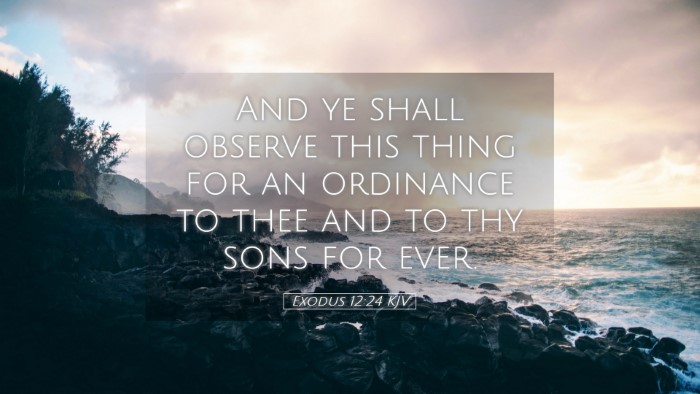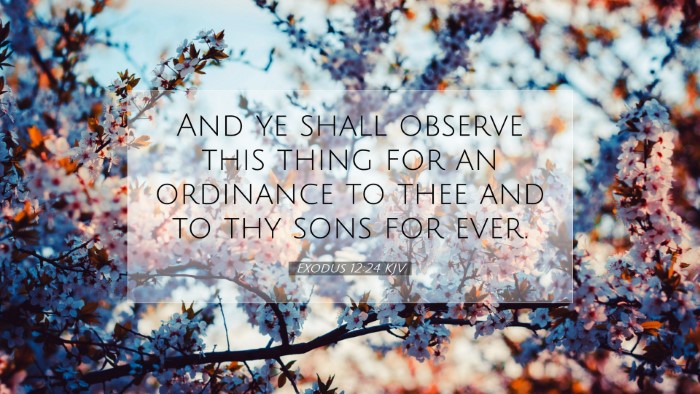Exodus 12:24 - Commentary
Verse Context: Exodus 12:24 states, “And ye shall observe this thing for an ordinance to thee and to thy sons for ever.” This verse occurs during the instructions God provides for the Passover, a pivotal event in the liberation of Israel from Egyptian bondage.
General Overview
The command in Exodus 12:24 is foundational for understanding the significance of remembrance in the Christian and Jewish traditions. It highlights the importance of observance, continuity, and teaching future generations about God's deliverance.
Matthew Henry's Commentary
According to Matthew Henry, this verse emphasizes the observance of the Passover as a perpetual ordinance, designed to maintain a remembrance of God's mighty acts of salvation. Henry notes that the phrase "this thing" refers directly to the Passover, which was instituted as a memorial of the Israelites’ deliverance from slavery.
He further explains that God desired not merely acts of worship but an internalization of His deeds amongst His people. This observance was meant to stimulate passing down the knowledge of God’s faithfulness from one generation to the next.
- Memorial Purpose: The observance serves a dual purpose: to commemorate the past and to instill hope in future generations.
- Family Involvement: Emphasizing the family unit, Henry stresses that the practices associated with Passover should involve the entire household, fostering collective memory and identity.
Albert Barnes' Commentary
Albert Barnes deciphers the directive in Exodus 12:24 by highlighting the critical nature of remembrance in the faith journey. He articulates that the observance of the Passover is not merely a ritualistic act but a divine ordinance that requires the engagement of the entire community of believers.
Barnes points out that the Passover had profound theological implications, as it symbolized God’s redeeming love and justice. By instructing the Israelites to observe this ordinance forever, God reinforces the notion of continuity within His covenant with His people.
- Importance of Tradition: Traditions connected to faith provide a framework for understanding God's attributes and actions throughout history.
- Community Impact: The observance invites collective participation, emphasizing the communal aspect of worship and the shared history of God’s people.
Adam Clarke's Commentary
Adam Clarke’s analysis brings forth the theological implications surrounding the ordinance mentioned in Exodus 12:24. He discusses the cultural and religious significance of the Passover, noting that it was distinctive in establishing the identity of the Israelites as a people chosen by God.
Clarke elaborates on the necessity for perpetual observance, suggesting that the ritual acts as a continual reminder of the covenantal relationship between God and Israel. The emphasis on “thee and to thy sons” denotes a generational transmission of faith that is crucial for maintaining religious integrity and understanding God's merciful actions.
- Generational Faith: Clarke stresses that parents have a spiritual mandate to teach their children about God’s salvation, thus fostering a heritage of faith.
- Ritual and Remembrance: The diligence in observing rituals keeps the covenantal relationship alive in the hearts of the people.
Theological Implications
The meditation on Exodus 12:24 reveals several theological truths vital for pastors and theologians.
- Significance of Obedience: The command to observe the Passover underscores the call to obedience, reflecting a heart aligned with God’s will.
- Covenant Identity: The verse is a profound reminder of the covenantal identity that defines the people of God, emphasizing both individual and community dimensions.
- Educational Imperative: There lies a strong call for religious education, ensuring that the knowledge of God’s acts becomes intrinsic in the fabric of community life.
Conclusion
Exodus 12:24 serves as an anchor for understanding God’s faithfulness and the importance of remembrance within the community of believers. Drawing from the insights of Matthew Henry, Albert Barnes, and Adam Clarke compels the Church to reflect on how traditions shape faith, the role of obedience, and the necessity of imparting spiritual truths to future generations.
As such, this verse should inspire leaders to cultivate a culture of remembrance and education within their congregations, ensuring that God's works are cherished and proclaimed for generations to come.


